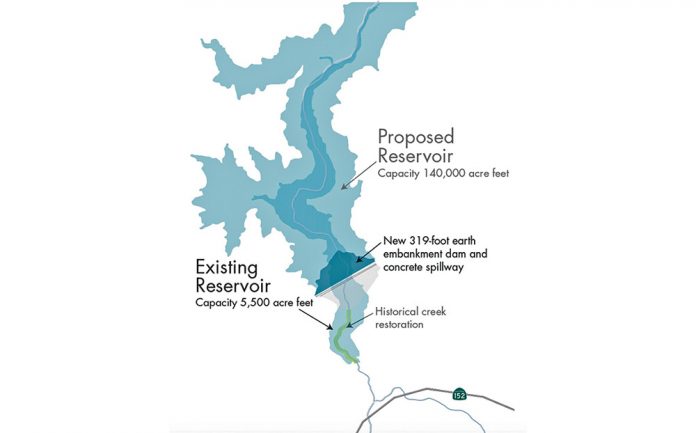Construction of a new Pacheco Reservoir has been given an important thumbs-up in a new environmental impact statement released last month.
The project would build a new dam and expanded reservoir on the North Fork of Pacheco Creek that could hold 140,000 acre-feet of water, a substantial increase from the 5,500-acre-foot capacity of the existing reservoir built 80 years ago.
The reservoir is located about 13 miles southwest of San Luis Reservoir off Highway 152, east of Gilroy.
The California Water Commission last year awarded the Pacheco Reservoir Expansion Project $484.55 million under Proposition 1, the water bond approved by voters in 2014 to fund new dams and water storage projects in California. This grant represents the full amount that was requested by a partnership of the San Benito County Water District, Santa Clara Valley Water District and Pacheco Pass Water District.
Construction on the $1 billion Pacheco Reservoir near Casa de Fruta would start in 2024, with a completion date of 2029, if federal and local funds are obtained.
Officially, the construction of the new Pacheco Reservoir is called the San Luis Low Point Improvement Project “to address water supply reliability and schedule certainty issues for the Santa Clara Valley Water District (Valley Water) associated with low water levels in San Luis Reservoir,” located on the eastern slope of the Diablo Range in Merced County.
The new draft environmental report favors construction of a new reservoir to help maintain a high-quality, reliable and cost-effective water supply for the Santa Clara Valley from the Central Valley.
State and federal officials prepared the joint draft Environmental Impact Statement—more than 600 pages analyzing the direct, indirect and cumulative effects of implementing various alternatives. Along with the environmental documentation process, the federal Bureau of Water Reclamation and Valley Water completed a feasibility study to identify and analyze alternatives. They recommended the fifth and most comprehensive alternative because it addresses both environmental and water supply issues.
Public comments on the study will be taken through Sept. 24, and a final environmental report is expected in the summer of 2020.
San Luis Reservoir is capable of receiving water from both the Delta-Mendota Canal and the California Aqueduct, pumping water into the reservoir during the wet season (October through March) and releasing water during the dry season (April through September) when demands are higher.
Deliveries from San Luis Reservoir to Valley Water flow west through the Pacheco Pumping Plant and Conduit. During the summer, high temperatures and declining water levels in San Luis Reservoir create conditions that foster algae growth. The thickness of the algae blooms vary, but typically average about 35 feet in depth, which results in water quality within the algal blooms that is not suitable for municipal and industrial water users relying on existing water treatment facilities in Santa Clara County.
If water levels fall too low, below an elevation of 369 feet above mean sea level, Valley Water cannot withdraw water from San Luis Reservoir because of water quality issues. San Luis Reservoir is the only delivery route for water from the Central Valley to Santa Clara County.
“The Pacheco Reservoir Expansion Project is a modern solution to the age-old challenges of providing a sustainable water supply for our expanding population and businesses,” the water district said in its summary description. “The project will reduce the frequency and severity of water shortages, provide flood protection for disadvantaged communities, as well as protect and grow the native steelhead population.”
The Pacheco Reservoir Expansion Project will increase reliability of imported water supplies to San Benito and Santa Clara counties and provide an emergency water supply to both counties. It also will reduce flood risks for communities along Pacheco Creek and the Pajaro River as it flows through Watsonville.
According to Valley Water and the state, the project will improve opportunities for water transfers through San Luis Reservoir and improve water quality, reducing taste and odor problems that result from seasonal algae blooms in San Luis Reservoir.
The plan endorsed in the new environmental report includes the construction and operation of a new dam and reservoir, pump station, conveyance facilities and related miscellaneous infrastructure.
The proposed total storage for the new reservoir is 141,600 acre-feet, the full pool elevation would be 694 feet and would inundate an additional 1,245 acres, for a total of 1,385 total acres inundated.
Water would be collected in the new reservoir during the winter months.This alternative would be operated by Valley Water to both improve habitat conditions for steelhead in Pacheco Creek and improve the district’s water supply reliability, including during drought periods and emergencies.
Valley Water still will have to find the remaining 50 percent of the project cost from federal sources and local water customers. Valley Water provides wholesale water and groundwater management services to local municipalities and private water retailers in Santa Clara County.








